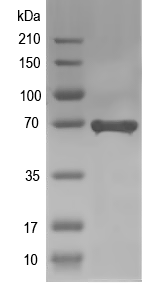Protein expression services for KCNQ1 | Potassium voltage-gated channel subfamily KQT member 1
Description
Potassium channel that plays an important role in a number of tissues, including heart, inner ear, stomach and colon (By similarity). Associates with KCNE beta subunits that modulates current kinetics (By similarity). Induces a voltage-dependent by rapidly activating and slowly deactivating potassium-selective outward current (By similarity). Promotes also a delayed voltage activated potassium current showing outward rectification characteristic (By similarity). During beta-adrenergic receptor stimulation participates in cardiac repolarization by associating with KCNE1 to form the I(Ks) cardiac potassium current that increases the amplitude and slows down the activation kinetics of outward potassium current I(Ks) (By similarity). Muscarinic agonist oxotremorine-M strongly suppresses KCNQ1/KCNE1 current (By similarity). When associated with KCNE3, forms the potassium channel that is important for cyclic AMP-stimulated intestinal secretion of chloride ions (By similarity). This interaction with KCNE3 is reduced by 17beta-estradiol, resulting in the reduction of currents (By similarity). During conditions of increased substrate load, maintains the driving force for proximal tubular and intestinal sodium ions absorption, gastric acid secretion, and cAMP-induced jejunal chloride ions secretion (By similarity). Allows the provision of potassium ions to the luminal membrane of the secretory canaliculus in the resting state as well as during stimulated acid secretion (By similarity). When associated with KCNE2, forms a heterooligomer complex leading to currents with an apparently instantaneous activation, a rapid deactivation process and a linear current-voltage relationship and decreases the amplitude of the outward current (By similarity). When associated with KCNE4, inhibits voltage-gated potassium channel activity (By similarity). When associated with KCNE5, this complex only conducts current upon strong and continued depolarization (By similarity). Also forms a heterotetramer with KCNQ5 that has a voltage-gated potassium channel activity (By similarity). Binds with phosphatidylinositol 4,5-bisphosphate (By similarity).
Family
Belongs to the potassium channel family. KQT (TC 1.A.1.15) subfamily. Kv7.1/KCNQ1 sub-subfamily.
Species
Felis catus
Fragment
single
Length
582 amino acids
Sequence
RVSIYSARRPLLARTHIQGRVYNFLERPTGWKCFVYHFAVFLIVLVCLIFSVLSTIEQYVALATGTLFWMEIVLVVFFGTEYVVRLWSAGCRSKYVGVWGRLRFARKPISIIDLIVVLASMVVLCVGSKGQVFATSAIRGIRFLQILRMLHVDRQGGTWRLLGSVVFIHRQELITTLYIGFLGLIFSSYFVYLAEKDAVNESGQVEFGSYADALWWGVVTVTTIGYGDKVPQTWVGKTIASCFSVFAISFFALPAGILGSGFALKVQQKQRQKHFNRQIPAAASLIQTAWRCYAAENPESSTWNIYVRKPTRSHTLLSPSPKPKKSVMVKKKKFKLDKDNGVSPGEKTLTVPHITCEPVSEKRRPDHFSVDTCDSSVKSPMLLEVSTTHFLRTNSVAEDLDLEGETPLVPITHVSQLREHHRATIKVIRRMQYFVAKKKFQQARKPYDVRDVIEQYSQGHLNLMVRIKELQRRLDQSIGKPSLFISVSEKSKDRGSNTIGARLNRVEDKVAQLDQRLVLITDMLQQLLSLHHGGPPGSRPPSGGGAQVQPCGPTNPELFLPGNALPTYEQLTVPRRGPEEGS
Mass
65.4 kDa
Simulated SDS-PAGE
 (Note: Representative image - actual molecular weight may vary depending on tag type and expression method)
(Note: Representative image - actual molecular weight may vary depending on tag type and expression method)Safety
Upon ordering, we will perform rigorous biosecurity and export control screening to ensure that order fulfillment is consistent with all legal and regulatory guidance.
Protein synthesis service
Make KCNQ1 using our protein expression services starting at $99 + $.30/amino acid in as fast as two weeks (includes the cost of DNA synthesis)
Order Here